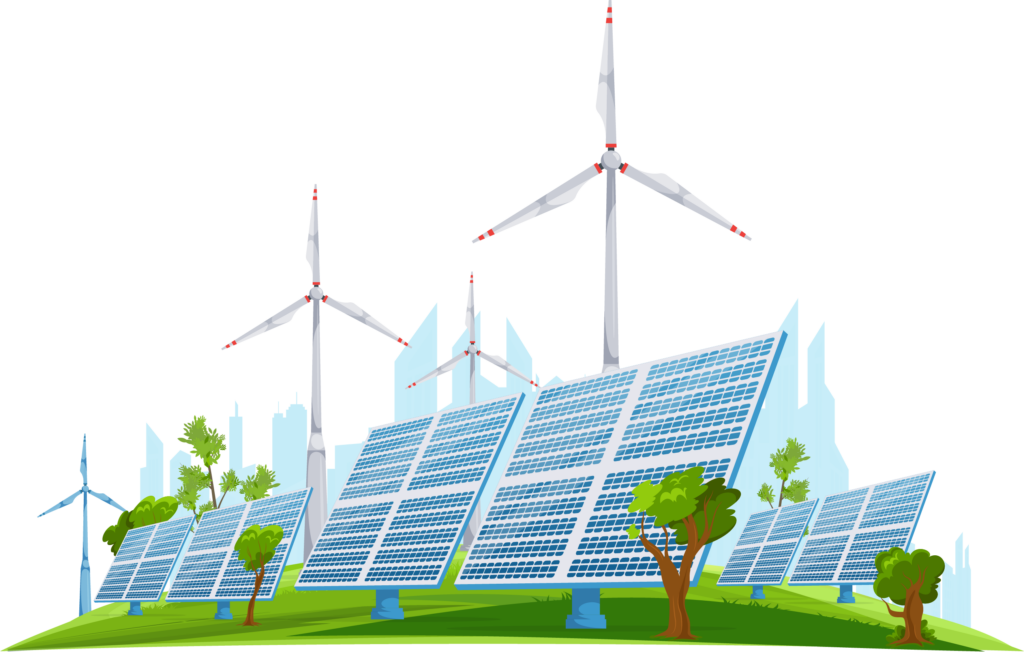The NREP Thematic Areas
Under NREP, Themes are supported by discipline and technology-based sector partners, each with a Theme Coordinator who has oversight of the strategic direction.
Technology Innovation, Development, and Deployment (TIDD)
Technology Innovation, Development, and Deployment (TIDD)
The Technology Innovation, Development, and Deployment (TIDD) thematic area is a core pillar of NREP’s mission to revolutionize Uganda’s renewable energy sector. This working group is dedicated to driving the adoption and scaling of innovative renewable energy technologies, while fostering a participatory approach to identifying and developing solutions tailored to Uganda’s unique needs.
Overview
TIDD focuses on:
- Identifying emerging technologies and innovations that align with Uganda’s energy needs.
- Facilitating technology transfer through partnerships with local and global innovators.
- Supporting pilot projects and action-oriented research to demonstrate the viability of renewable energy solutions.
Key Activities
- Technology Adoption: Promoting renewable energy technologies like off-grid solar systems, energy-efficient appliances, and biomass solutions, and building capacity for effective deployment.
- Innovation Platforms: Hosting forums and hubs to connect researchers, entrepreneurs, and investors, while encouraging new ideas through innovation challenges.
- Market Linkages and Scaling: Facilitating market access for renewable energy products and services, and scaling technologies through commercialization and private sector partnerships.
- Business Incubation: Establishing centers to support start-ups and small businesses with mentorship, funding opportunities, and technical assistance.
Objective
To enhance the competitiveness of local actors while mobilizing investments for public institutions and private sector organizations in the domestic, industrial, and commercial renewable energy and energy efficiency markets.
Expected Results
- Expanded adoption of innovative technologies across all sectors.
- Increased private sector involvement in renewable energy markets.
- Strengthened capacity of local actors to compete regionally and globally.
- Improved investment inflows to support Uganda’s renewable energy goals.
Information and Knowledge Hub (RE-Khub)
Information and Knowledge Hub – RE-Khub
The Information and Knowledge Hub (RE-Khub) is a vital thematic area aimed at establishing a one-stop center for renewable energy and energy efficiency (RE&EE) data, information, and resources. By consolidating inputs from stakeholders, it ensures that data and knowledge in the sector are captured, organized, and disseminated through innovative tools and targeted communication products.
Key Elements
- Development of targeted RE&EE communication products to address specific stakeholder needs.
- Creation of a web-based portal to provide easy access to sector data and trends.
- Establishment of a physical information resource center for in-person access to knowledge.
- Implementation of gender-responsive feedback mechanisms to ensure inclusivity.
- Capacity development initiatives to enhance stakeholder ability to utilize the knowledge hub effectively.
Objective
To provide a one-stop center for RE&EE data and information to support planning, policy, research and development, market growth, and trend forecasting.
Expected Results
- Knowledge Hub and a robust information management system operationalized.
- Increased recognition of NREP as a central resource for RE&EE information.
- Enhanced utilization of RE&EE data and knowledge for evidence-based planning and policy formulation.
Outcome
Enhanced recognition of NREP and increased utilization of the RE&EE data and knowledge management system.
Access to Finance (RE-Finance)
Access to Finance (RE-Finance)
The Access to Finance (RE-Finance) thematic area focuses on addressing the challenges of financing renewable energy projects and businesses in Uganda. While the country has seen significant advancements in the renewable energy market, there remains a need for targeted funding mechanisms, including public and private investment, to support the sector’s growth and accelerate energy access.
Key Focus Areas
- Leveraging smart subsidies to attract philanthropic and private capital.
- Creating a conducive environment for energy providers by implementing technical reforms.
- Fostering collaboration among policymakers, development partners, investors, and enterprises to catalyze investment.
- Exploring the roles of public and private financing in expanding energy access.
Objective
To provide differentiated support to entrepreneurial RE&EE businesses across their development lifecycle, including start-up, early-stage, growth, and maturity phases.
Expected Results
- Establishment of a Renewable Energy and Energy Efficiency (RE&EE) Project Preparation Facility to improve investment readiness.
- Increased support for RE&EE business start-ups and entrepreneurship initiatives.
- Enhanced access to financial resources across the renewable energy enterprise lifecycle.
Outcome
RE&EE business start-up and entrepreneurship support strengthened to drive sector growth and innovation.
Training, Research & Communities of Practice (C-R4D)
Training, Research & Communities of Practice (C-R4D)
The Training, Research & Communities of Practice (C-R4D) thematic area is dedicated to advancing knowledge, capacity, and innovation in renewable energy and energy efficiency (RE&EE). This working group leverages the expertise of research institutions, think tanks, and communities of practice to collect, analyze, and disseminate actionable data and recommendations that shape policy and trade strategies in the sector.
Key Focus Areas
- Engaging with energy research for development to provide evidence-based recommendations for RE&EE policy and trade strategies.
- Documenting and synthesizing data that supports advocacy and discourse in the RE&EE sector.
- Establishing Renewable Energy and Energy Efficiency Centers (REEECs) to foster locally-oriented innovation and sustainable development practices.
- Organizing demand-driven training programs tailored to stakeholders’ immediate needs.
- Collaborating with leading institutions, such as Makerere University and The Open University in the UK, to explore innovative configurations for higher-value renewable energy use.
Objective
To establish a comprehensive energy readiness program that equips stakeholders with the knowledge and skills needed for a sustainable energy future.
Expected Results
- Development of Regional Renewable Energy and Energy Efficiency Centers (REEECs).
- Creation of an Energy Modelling and Integration Virtual Laboratory to enhance skills and knowledge in RE&EE systems.
- Increased stakeholder preparedness for sustainable energy adoption through targeted training and research initiatives.
Outcome
Development of domesticated RE&EE systems, research, piloting, and enhanced RE&EE modelling skills and knowledge.
Policy, Planning, Standards, Quality, Institutions, and Markets (PPSQIM)
Policy, Planning, Standards, Quality, Institutions, and Markets (PPSQIM)
The Policy, Planning, Standards, Quality, Institutions, and Markets (PPSQIM) thematic area focuses on addressing policy-related challenges that hinder the growth and commercialization of Uganda’s renewable energy and energy efficiency (RE&EE) sector. By analyzing and advocating for improved market intervention policies, PPSQIM seeks to create a supportive and equitable environment for clean energy access and implementation.
Key Focus Areas
- Analyzing existing policies on subsidies, tariffs, customs fees, freight charges, and infrastructure to assess their impact on transaction costs and market performance.
- Addressing the lack of equitable market access to RE&EE input and output markets by advocating for inclusive policy reforms.
- Enhancing capacity for evidence generation and advocacy to drive policy enactment and effective implementation.
- Facilitating national dialogues and workshops to identify policy issues for rationalization and harmonization.
- Developing a comprehensive policy reform agenda and promoting regional and national consensus-building forums.
Objective
To increase clean energy access and improve livelihoods for communities through technically sound mini-grid systems and equitable policy frameworks.
Expected Results
- Drafting and implementation of a Renewable Energy Act for Uganda.
- Enhanced adoption of RE&EE systems for productive use and mini-grid development.
- Improved policy environment to support sustainable energy sector growth and equitable market access.
Outcome
Enhanced uptake of RE&EE systems for productive use of energy and mini-grids development.
Download the Strategic Plan for the National Renewable Energy Platform (2023 – 2028)

Useful Links
Subscribe Now
Don’t miss our future updates! Get Subscribed Today!
Office Address: Amber House, 2nd Floor Block A, Room A203, Plot 29/33, Kampala Road Kampala, Uganda | Working Hours: Mon - Friday 8:00 - 17:00 | Postal Address 163345, Kampala, Uganda
©2024. NREP - Uganda. All Rights Reserved.
Objective:
The objective is to identify effective and efficient mechanisms for development of the renewable energy sector through technical skills expertise transfer and discourse in Uganda in general, and among the communities of practice in particular.
Output:
RE Technical skills Capacity, and Communities of Practice in place Strengthened.
Training, Research and Functional national think tanks on RE development and productive use of energy developed.
Objective:
The major objective is to strengthen renewable energy technological developments, deployment and transfer in Uganda. This will be through enhanced innovation and development of renewable energy technologies, piloting and transfer of more effective innovations in the renewable energy arena. The thematic group will promote latest technology, developing market linkages and commercialization
Output:
Renewable Energy Technology and Innovation development, transfer and deployment, development of market linkages strengthened in Uganda.
Increased adoption and deployment of renewable energy technologies among communities of practice, private sector, and across all consumer entities. Increased Market development and commercialization of contemporary technologies.


